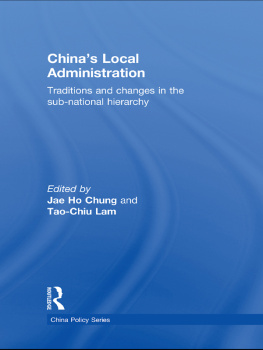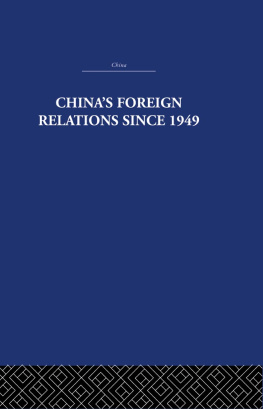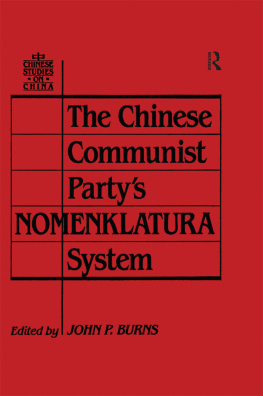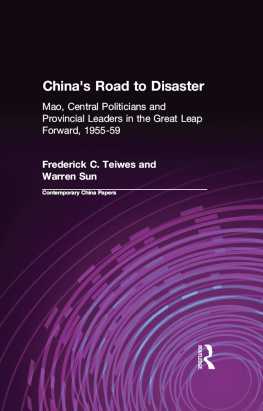
Chinese Provincial Leaders
This is an exhaustive study of China's provincial leaders, a group of important players in local- and national-level Chinese politics. Based on biographical data on more than 2,500 individuals in China's thirty provincial units from 1949 to 1998virtually the entire history of the PRCthis study is the most comprehensive, up-to-date, and systematic treatment of this group of political elites ever published. It presents detailed accounts of four categories of provincial leaders (party secretaries, deputy party secretaries, governors, and vice governors) in terms of their personal characteristics such as age, gender, nationality, hometown, education, party membership, and length of party membership. It describes the political mobility of these leaders over the period under study in terms of promotion, demotion, lateral transfer, and retirement. Using both personal characteristics and provincial characteristics as independent variables, this study also represents the field's most systematic and sophisticated statistical analysis of the political mobility of these individuals.
A central conclusion of this analysis is that the political mobility of China's provincial leaders, especially in the era of economic reform, is determined by the economic performance of their provincial units. The worse the record of economic performance, the more likely the provincial leader will be demoted. Moreover, the revenue contributions of a province to the Center during the provincial leader's tenure is also a determinant of the political mobility of that leader.
The wealth of data and information in this book dissolves much of the confusion on this subject and will shape or reshape many debates in field of Chinese politics, in general, and on China's provincial leaders, in particular. Substantively interesting and methodologically sophisticated, this study and the research methods adopted in it will serve as a model for future inquiries.
Studies on Contemporary China
Titles in this series are concerned with China in the second half of the twentieth century, but may also reach back to the roots of the communist movement from the 1920s on.
For a complete listing of the titles in this series, see the back of the book.
Chinese Provincial Leaders
ECONOMIC PERFORMANCE AND POLITICAL MOBILITY SINCE 1949
ZHIYUE BO
First published 2002 by M. E. Sharpe, Inc.
Published 2019 by Routledge
2 Park Square, Milton Park, Abingdon, Oxon, OX14 4RN
52 Vanderbilt Avenue, New York, NY 10017
Routledge is an imprint of the Taylor & Francis Group, an informa business
Copyright 2002 by Taylor & Francis.
All rights reserved. No part of this book may be reprinted or reproduced or utilised in any form or by any electronic, mechanical, or other means, now known or hereafter invented, including photocopying and recording, or in any information storage or retrieval system, without permission in writing from the publishers.
Notice:
Product or corporate names may be trademarks or registered trademarks, and are used only for identification and explanation without intent to infringe.
Library of Congress Cataloging-in-Publication Data
Bo, Zhiyue.
Chinese provincial leaders: economic performance and political mobility since 1949 /
Zhiyue Bo.
p. cm.
"An East gate book."
Includes bibliographical references and index.
ISBN 0-7656-0916-9 (hc: alk. paper)
1. Provincial governmentsChina. 2. Political leadershipChinaProvinces. 3.
ChinaEconomic conditions1949- 4. ChinaPolitics and government1949- I.
Title.
JQ1519.A598 B6 2002
352.23'213'095109045dc21
2002022164
ISBN 13: 978-0-7656-0916-8 (hbk)
To my wife, Yan, for her love and support.
This book has grown out of my dissertation completed at the University of Chicago. I cannot express enough my gratitude to my advisors at the University of Chicago. Professor Adam Przerworski, my committee chair, guided me through the whole process of learning by his superb example and germane and timely advice. He urged me to concentrate on what I needed to learn and pushed me to learn as efficiently as I could. He was a source of pressure and encouragement. I was very fortunate to have Professor Bill Parish on my dissertation committee. He was extremely patient with a slow learner such as myself and never tired of showing me the basics in my project. He read each of my chapters with great care and wrote out detailed suggestions. My dissertation and consequently this book would have been impossible without his valuable suggestions. Professors Dali Yang and Guy Alitto were also members of my committee. Dali Yang was always generous in providing relevant materials and suggestions. Guy Alitto was willing to share his expertise on Chinese history and politics when my dissertation was to be defended. My thanks also go to Professors Robert Scalapino, David S.G. Goodman, and Dorothy Solinger for their advice and encouragement.
Mr. Yee-chip Wong, a staff member of the Far East Asian Library, the University of Chicago, was an excellent advisor on Chinese sources concerning Chinese provincial leaders. Charles Chang and Chihong Chang, both site assistants of the SPC2 at the University of Chicago, assisted me in using statistical software packages. Susan Fanelii, a graduate student in the Master of Science in International Studies program at St. John Fisher College, helped me with numerous drafts of contents and tables. My assistant, Bojana Zivanovic, meticulously assisted me on the bibliography section. And my colleagues at St. John Fisher College, Bill Waddell, John D. Rhoades, and especially David Sanders and John D. Harman, spent their valuable time making this book more readable and understandable.
This project has also benefited from two workshops. Participants in the workshop East Asian Economics, Society, and Politics at the University of Chicago, especially Bernard Silberman, Stephen Herschler, and Suk-jun Lim, and participants in the workshop Comparative, International, and Asian Societies Seminar at the University of Illinois at Chicago, especially Xiangming Chen, provided perceptive comments and suggestions. Financial support from the University of Chicago, two fellowships from the Mellon Foundation, and a faculty development grant from St. John Fisher College are gratefully acknowledged. And my thanks also go to Doug Merwin and Patricia Loo of M.E. Sharpe for their confidence in and support for the project and to Esther Clark of M.E. Sharpe for her helpful copyediting suggestions.
My wife Yan Dong and my son Lin Bo deserve my greatest gratitude. Yan has always been supportive in the process of preparing the dissertation and this book. Her tremendous faith and unfaltering support have made this book possible. Lin has grown from a toddler to a teenager during the years when an idea became a dissertation, a series of published articles, and finally a book. He has been a source of joy and encouragement. Last but not least, thanks go to my father. Bo Tingxiang, and my mother, Zhang Shaoqing, who have nurtured me over the years. They have taught me to be the best at whatever I do and have supported me whenever I needed them.








